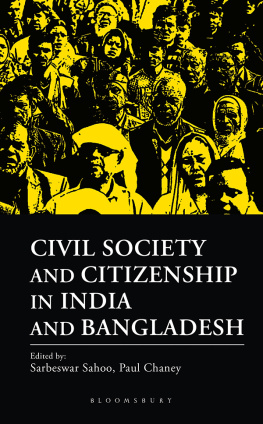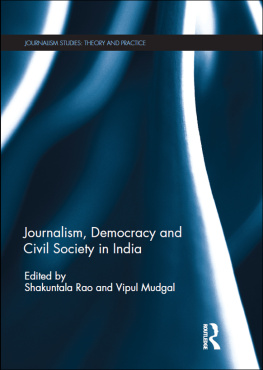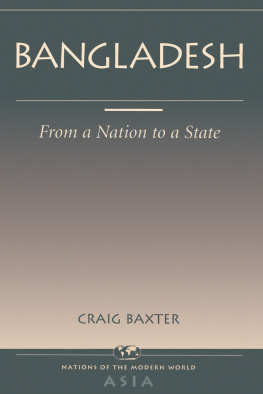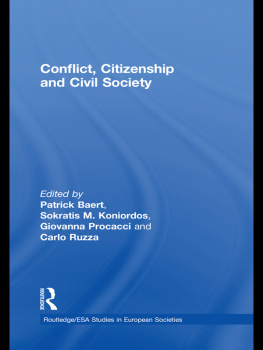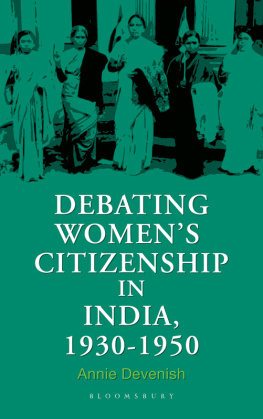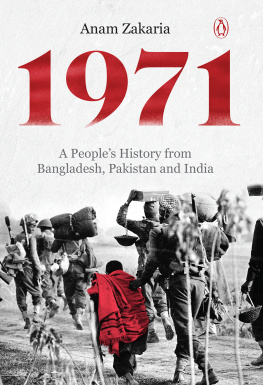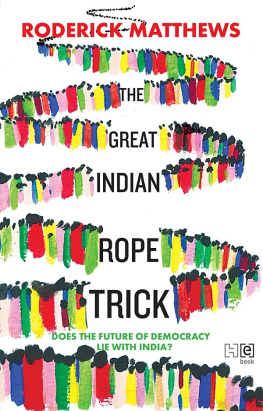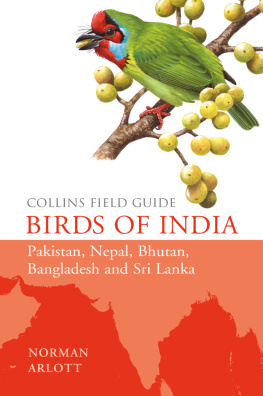Sahoo Sarbeswar - Civil Society and Citizenship in India and Bangladesh
Here you can read online Sahoo Sarbeswar - Civil Society and Citizenship in India and Bangladesh full text of the book (entire story) in english for free. Download pdf and epub, get meaning, cover and reviews about this ebook. publisher: Bloomsbury Publishing India Pvt. Ltd., genre: Politics. Description of the work, (preface) as well as reviews are available. Best literature library LitArk.com created for fans of good reading and offers a wide selection of genres:
Romance novel
Science fiction
Adventure
Detective
Science
History
Home and family
Prose
Art
Politics
Computer
Non-fiction
Religion
Business
Children
Humor
Choose a favorite category and find really read worthwhile books. Enjoy immersion in the world of imagination, feel the emotions of the characters or learn something new for yourself, make an fascinating discovery.
- Book:Civil Society and Citizenship in India and Bangladesh
- Author:
- Publisher:Bloomsbury Publishing India Pvt. Ltd.
- Genre:
- Rating:4 / 5
- Favourites:Add to favourites
- Your mark:
- 80
- 1
- 2
- 3
- 4
- 5
Civil Society and Citizenship in India and Bangladesh: summary, description and annotation
We offer to read an annotation, description, summary or preface (depends on what the author of the book "Civil Society and Citizenship in India and Bangladesh" wrote himself). If you haven't found the necessary information about the book — write in the comments, we will try to find it.
Civil Society and Citizenship in India and Bangladesh — read online for free the complete book (whole text) full work
Below is the text of the book, divided by pages. System saving the place of the last page read, allows you to conveniently read the book "Civil Society and Citizenship in India and Bangladesh" online for free, without having to search again every time where you left off. Put a bookmark, and you can go to the page where you finished reading at any time.
Font size:
Interval:
Bookmark:

Praises for Civil Society and Citizenship in India and Bangladesh
This is a fine and thought-provoking collection of articles about civil society in India and Bangladeshtwo countries where issues of civil society and those of class, gender, religion and ethnicity (as well as caste) have been historically so intertwined. The articles provide detailed analysis of their case studies, the results of which are useful for comparative analysis and incursions into theoretical debates. Sometimes, work on civil society can appear to be stale, because the concept can mean different things to different people, but in ways often left unacknowledged. The sort of critical awareness necessary to actually enrich discussions of civil society, rather than contribute to its elusiveness, pervades through the book.
Professor Vedi R. Hadiz
Asia Institute, University of Melbourne, Australia
With civil society criticality under mounting pressure around the world, this excellent and carefully curated collection of essays focusing on gender issues and the status of religious minorities introduces readers to the dynamics shaping the complex relationship between CSOs and the state in todays India and Bangladesh.
Professor Sarah Ansari
Royal Holloway, University of London
This volume prioritises Tocquevillian associational forms in various actors engagements in the civil society space. Issues of gender rights, minority rights and statecivil society relations are examined on the basis of painstaking fieldwork in a comparative framework between India and Bangladesh. This volume should be a compulsory read for everyone who is interested in contemporary contests in the civil society space in South Asia, wherein new associational forms are emerging, leading to construction of new parameters of engaged citizenship.
Professor Amit Prakash
Centre for the Study of Law and Governance,
Jawaharlal Nehru University, New Delhi
This edited anthology is a timely and an important contribution to the scholarship on civil society and citizenship, particularly in South Asia. Both empirically and theoretically, this volume meticulously presents the tension and trajectories of relationship between state, civil society and citizenship through exploring women organisations, religion, gender, minority and refugee issues in India and Bangladesh.
Associate Professor Mohammad Salehin
Centre for Peace Studies,
The Arctic University of Norway, Norway
Civil Society and Citizenship in India and Bangladesh
Civil Society and Citizenship in India and Bangladesh
Edited by
Sarbeswar Sahoo and Paul Chaney

BLOOMSBURY INDIA
Bloomsbury Publishing India Pvt. Ltd
Second Floor, LSC Building No. 4, DDA Complex, Pocket C 6 & 7,
Vasant Kunj, New Delhi, 110070
BLOOMSBURY, BLOOMSBURY INDIA and the Diana logo are trademarks of Bloomsbury Publishing Plc
First published in India 2021
This edition published 2021
Copyright Sarbeswar Sahoo, Paul Chaney, 2021
Sarbeswar Sahoo and Paul Chaney have asserted their right under the Indian
Copyright Act to be identified as the Editors of this work
All rights reserved. No part of this publication may be reproduced or transmitted in
any form or by any means, electronic or mechanical, including photocopying,
recording or any information storage or retrieval system, without the prior
permission in writing from the publishers
This book is solely the responsibility of the author and the publisher has had no
role in the creation of the content and does not have responsibility for anything defamatory or libellous or objectionable
Bloomsbury Publishing Plc does not have any control over, or responsibility for,
any third-party websites referred to or in this book. All internet addresses given in
this book were correct at the time of going to press. The author and publisher regret any inconvenience caused if addresses have changed or sites have ceased to exist, but can accept no responsibility for any such changes
ISBN: HB: 978-93-89611-35-9; eBook: 978-93-89611-37-3
Created by Manipal Technologies Limited
To find out more about our authors and books visit www.bloomsbury.com and sign up for our newsletters
Contents
A historian of ideas will testify that concepts that, otherwise, share common vocabularies develop in different ways in discrete historical contexts. Take the concept of civil society. Emerging as a dominant concept in the 1980s in the erstwhile socialist world of Eastern Europe, civil society signified a space where social movements and associations could make demands upon the state, monitor and hold a democratic state accountable, and protest against policies, programmes and laws that were manifestly unjust. Civil society fulfilled a basic proposition of democracy. Ordinary citizens possess the political competence to critique government policies, protest against the oppression of vulnerable groups and propose alternative policies to neutralise injustice. That is why civil society is best thought of as a project of many projects. Some projects affirm each other, some oppose others, some take on the state and others support the state as the condensate of power. There is no one essence to civil society; it is the theatre of democracy.
In the world of the colonised, civil society was not born out of the same historical experience as Europe: an autonomous market, alienation, a juridical order, the individual as the bearer of legal rights and property relations. Civil society organisations in undivided India were related to the freedom struggle and its agenda of social reform, nationalism, uplift of weaker sections, education, charity and welfarism. Nationalism gave rise to the idea that we have obligations to our fellow beings.
This sentiment was subverted by the partition of India in August 1947. The Partition bore dreadful consequences in the shape of involuntary mass migrations, ethnic cleansing, gang rapes and sordid mutilationsall of which have left vivid scars upon the memories of populations on both sides of the border. In 1971, when East Pakistan declared itself independent of Pakistan, an estimated 3 million people died in the war between the new state of Bangladesh and the parent country. About 8 to 10 million were rendered homeless. In another historical context, A.E. Housman had written: They say my verse is sad: no wonder, Its narrow measure spans, Tears of eternity and sorrow, Not mine, but mans. These lines may well provide the epigraph of partitions.
The birth of first two, and three nations was embedded in massive violence. This is the first factor that adversely impacted the body politic in India and Bangladesh. The second factor was the logical consequence of partitionsthe minority issue. The third troublesome factor was the emergence of identity politics as a dominant feature of the political scene. And the fourth factor was state-sponsored construction of the nation.
The historian, Hans Kohn, writing in the aftermath of the Second World War had pointed out that territorially based civic nationalism is qualitatively distinct from cultural or ethnic nationalism. The former, which developed in England, the United States and France, represented predominantly a political movement to limit governmental power, and to secure civic rights. The temporal and the spatial contexts for ethnic nationalism, which arose later in Central and Eastern Europe and in Asia, were different. Consolidated amidst social and economic underdevelopment, and emerging in direct opposition to state power, ethnic nationalism was first articulated in the aesthetic and cultural field. Kohns distinction between civic and ethnic nationalism set the stage for much of the subsequent discussion on the subject.
Next pageFont size:
Interval:
Bookmark:
Similar books «Civil Society and Citizenship in India and Bangladesh»
Look at similar books to Civil Society and Citizenship in India and Bangladesh. We have selected literature similar in name and meaning in the hope of providing readers with more options to find new, interesting, not yet read works.
Discussion, reviews of the book Civil Society and Citizenship in India and Bangladesh and just readers' own opinions. Leave your comments, write what you think about the work, its meaning or the main characters. Specify what exactly you liked and what you didn't like, and why you think so.

